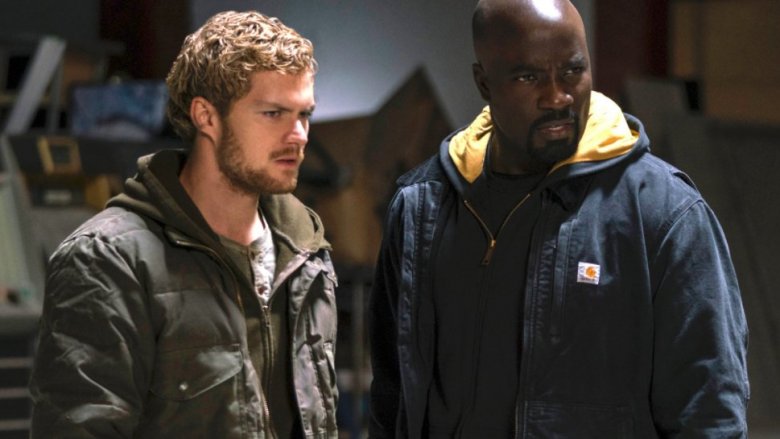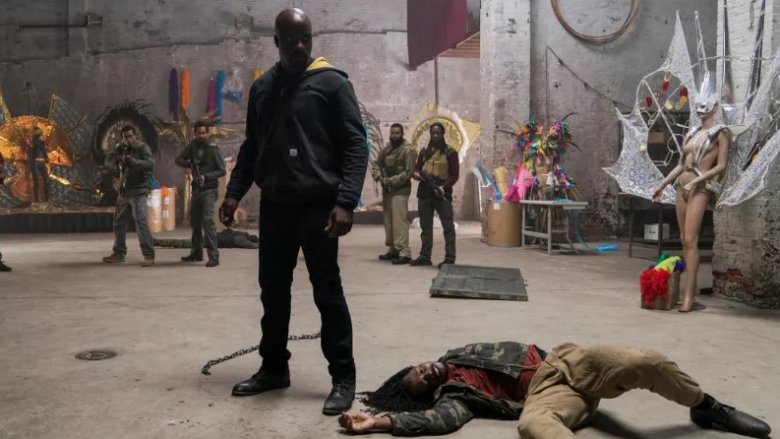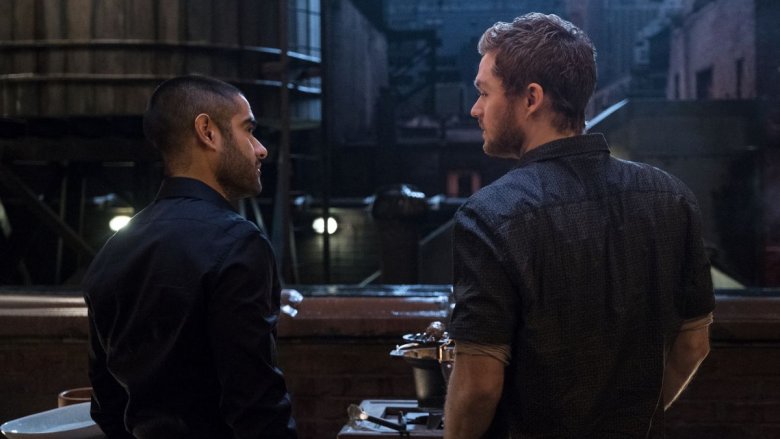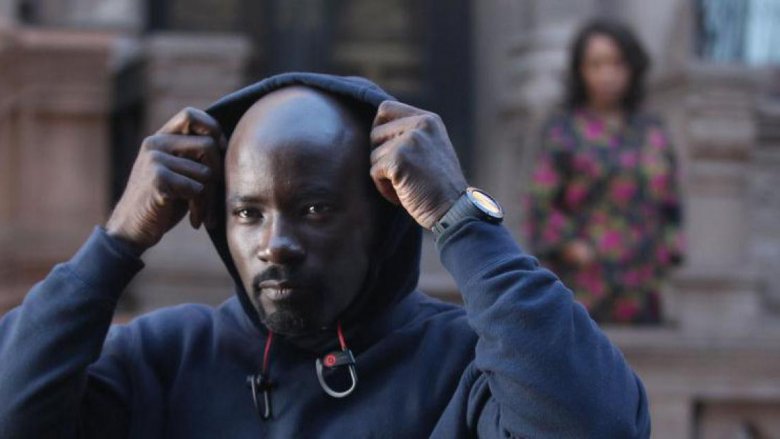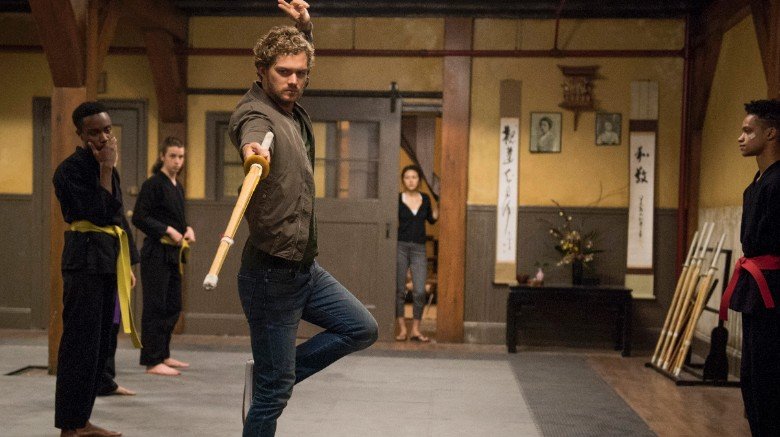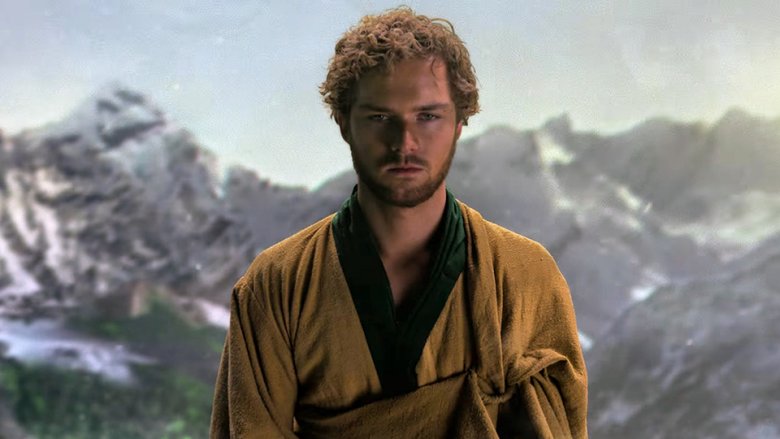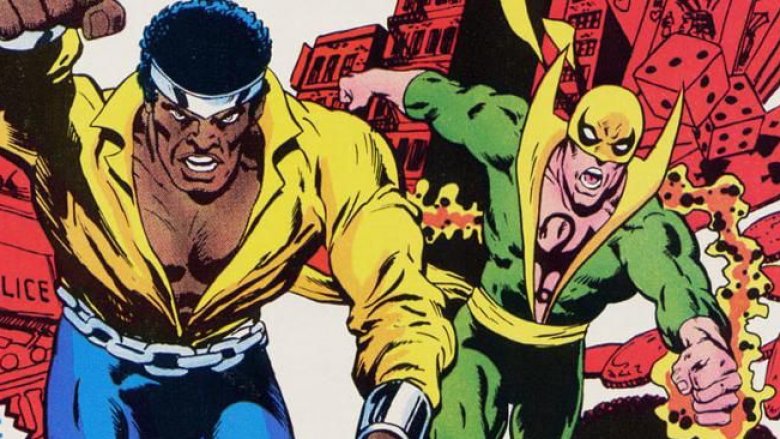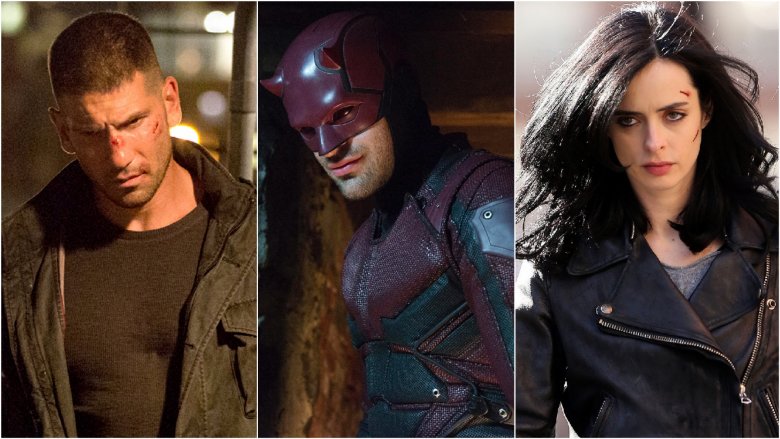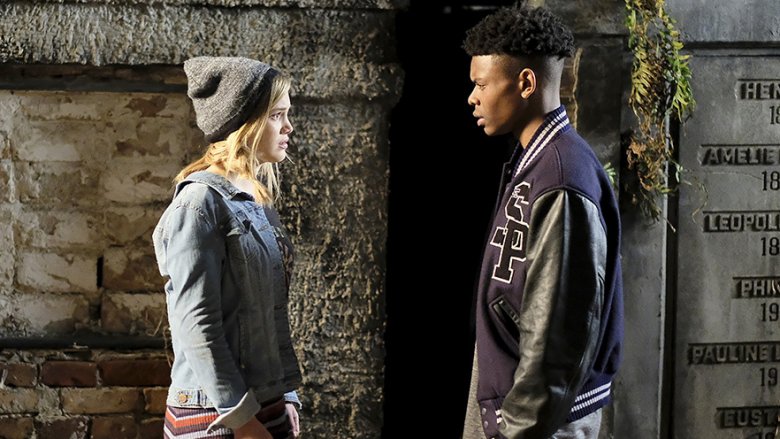The Real Reason Netflix Cancelled Iron Fist And Luke Cage
It's official: two out of the four Defenders have had their solo series axed. If you were a diehard Danny Rand or Luke Cage fan, your favorite characters aren't receiving third seasons. Given that Daredevil received a season 3 and Jessica Jones is still scheduled to get hers, along with Punisher gearing up for a season 2, it's not as though Netflix and Marvel have pulled the plug overnight on all of their edgier-than-average Marvel superhero shows, so fans of the properties can breathe easy there. Still, it's highly unusual for two closely related series to get canned within a week of each other with no build-up or explanation. No cast or crew made controversial social media posts, there weren't any updates about production nightmares behind the camera... really, there wasn't much of anything preceding the ends of Iron Fist and Luke Cage. With that in mind, let's go over the possible reasons for the sudden downfall of two of Marvel's Netflix properties.
Creative differences
While it seems unlikely that sudden creative differences could ever be the sole reason why Luke Cage and Iron Fist failed to nab third seasons within a week of each other, The Hollywood Reporter claims that was (according to a rumor) part of the issue, at least with regards to Luke Cage. "Creative differences" is a vague term, but it could mean many things: showrunners and execs butting heads over plot trajectory, character arcs, how the season was planning to integrate with other Netflix-Marvel brands; you get the idea. Considering both cancelled shows had managed two solo seasons each without issue, it seems odd that the showrunners, Netflix, and Marvel suddenly hit back-to-back speed bumps in their relationships that couldn't be mended. Still, boiling creative tensions could definitely be the straw that broke the camel's back (or the excuse that broke it), if other logistical components were already in play.
Disney Play
It's not a stretch to imagine that the impending arrival of Disney's streaming service, Disney Play, is likely throwing a huge monkey wrench into the works for all of Disney and Netflix's joint TV properties. Given that Disney Play is arriving in 2019 and is set to be the exclusive host for almost all of Disney's original content, including Star Wars and Marvel projects, it makes sense that this might be the first move by Disney to bring its boys home.
If Disney is, in fact, terminating shows with Netflix in order to have all its Marvel eggs in one basket, the question remains: what will Disney actually do with the IPs? The whole point of the Netflix shows was to be an outlet for grungier, darker stories within the Marvel Universe while Disney played with the cuter stuff like Ant-Man, the Avengers, and Agents of SHIELD. If Disney doesn't want to bring that kind of edge over to their ostensibly family-friendly streaming service, could this be the end of Luke Cage and Iron Fist for good? Did Disney end these shows so brand (and, by extension, tonal) unity is at its peak once Disney Play launches? Or does the company have plans for Danny, Luke, and company once the Netflix deals are over?
Mixed Reception
At least on the Iron Fist side of things, quality control was, and has been, a real issue. Both seasons 1 and 2 failed to win the world over, as can be evidenced by their unsavory Rotten Tomatoes scores. Critics and fans alike just couldn't get behind the show's slow pacing, mishandled protagonist, and the scores of other issues both unique to Iron Fist and symptomatic of the Marvel-Netflix formula as a whole.
Luke Cage definitely fared better with critics, but it couldn't escape some of the wider cross-brand complaints either. Episodic bloat, extraneous plot threads, and other unwarranted inclusions irked a lot of people, proving that perhaps Netflix's and Marvel's formulaic approach to TV wasn't infallible. There's a chance the two companies recognized this and, after closely analyzing public reception and behind-the-scenes metrics, determined these shows were sinking ships and that it was better to pull the plug now rather than throw more good money after bad.
Stagnation
After Matt, Luke, Jessica, and Danny received their big team-up season with The Defenders, fans of the Netflix-Marvel-verse got excited about future cross-brand opportunities. Would we get another team-up round with a Defenders: Season 2? Would this show of unity between properties finally make it feasible for the four street-level heroes to make some sort of joint appearance in the Marvel Cinematic Universe? These questions swirled through fans' minds, until... nothing happened. No second season of The Defenders ever materialized, and the MCU never dared to even reference the existence of the Netflix shows' characters, much to the chagrin of Marvel's television fans.
This paints a pretty clear (and sad) picture of where the Netflix shows have been heading: nowhere. There's still no Defenders season 2 in sight, and it's not like Matt Murdock and his crew are going to get a big-screen spotlight in a Marvel movie. When coupled with the other factors mentioned thus far, it's no surprise Netflix and Marvel saw little consequence in ending two of the four budget Avengers' solo runs.
Views
Netflix doesn't release viewership numbers publicly, so there's no way of knowing whether those figures had a major impact on the Marvel and Netflix head honchos' decision to end Iron Fist and Luke Cage. Still, between over-saturation and brand stagnation, there might very well have been a dip in viewership across the shows. Let's examine.
Netflix and Marvel have had six different properties going concurrently for some time: Daredevil, Jessica Jones, Luke Cage, Iron Fist, The Defenders, and The Punisher. Across these shows, 11 seasons' worth of television were produced and released between 2015 and 2018, with four of those seasons debuting in 2018 alone. That's a lot of superhero TV to stuff down Marvel fans' throats, especially when you consider that most of those seasons contained copious amounts of padding and filler. Couple that with the lack of a bigger-picture trajectory for the long-term lifespan of the brands, and maybe this abundance of missteps led to a decline in viewership that Netflix and Marvel could no longer ignore.
Heroes for Hire
This idea might be a long shot, but perhaps it's not all doom and gloom for Danny and Luke. Maybe there's even a reason they're the two specific Defenders to get the ax.
In the comics, the Immortal Iron Fist and Luke Cage have teamed up to form a group known as Heroes for Hire. This group involved the two aforementioned male leads as well as their co-stars onscreen and on the page, Colleen Wing and Misty Knight. As such, it'd be a seamless transition if Marvel wanted to plop all four leads into a new hybrid superhero show that still continued the Netflix era's continuity.
The question is, were this show to happen, what form would it take? Would it be a property custom-made to conform to Disney Play's family-friendly brand, or would it be an organic extension of the original Iron Fist and Luke Cage Netflix series? If Marvel dared to make this show, people would expect it to, at least in dialogue, involve references to Matt Murdock and Jessica Jones — but would that happen? Who knows. In any event, here's hoping this isn't the last we've seen of Danny Rand and Luke Cage, two of the coolest small-screen heroes we've had the pleasure of watching save New York City from peril.
What remains
With Iron Fist and Luke Cage out of the picture, that leaves the question of what's in store for the futures of Daredevil, Jessica Jones, and The Punisher.
While we know that Jessica Jones has a season 3 on the way and The Punisher is still set to get his own season 2, that only gets us through a good chunk of 2019 (as well as part of 2020, if something delays either series or Daredevil season 4 happens). Who's to say that, once all of Marvel's current obligations with Netflix wrap, around the same time that Disney Play arrives, Disney won't see fit to finish what's been started with the ends of Iron Fist and Luke Cage? Then it'd have all the Defenders under its control.
Of course, there's always the chance that Disney, Marvel, and Netflix were just culling shows for quality control purposes, and that they're simply being stingy about only letting shows with real potential stay on the air. In that case, maybe we'll still see Daredevil, Jessica Jones, and Punisher on Netflix going forward. Maybe characters will still interact with each other across shows, too, which would allow for cameos from Luke and Danny. After all, just because their shows are dead doesn't mean their characters are, too.
A third and final theory is that, if the end really is near for the Defenders on Netflix, Daredevil season 4 will bring all four heroes back together for one last hurrah.
The rest of Marvel TV
It isn't like Marvel's Netflix offerings are the only live-action superhero content the company is currently putting out on the small screen. Marvel also has deals with Hulu, ABC, Freeform, FX, and Fox for several ongoing shows. First, there's Agents of S.H.I.E.L.D., which hasn't stopped chugging along since its debut in 2013. There's also Marvel's Runaways. Plus, we can't forget about Cloak and Dagger, the newest addition to Marvel's TV lineup. And then there are the two X-Men themed shows, The Gifted and Legion. That's a lot of TV!
Is it in the cards for Disney to go around aggressively collecting these properties like Thanos did with the Infinity Stones? It's possible, since some of the shows mentioned have upcoming seasons set for mid to late 2019, which would be right around the time Disney Play shows up. Should any of these network shows start to falter in ratings, critical success, or general profitability, it's safe to assume Disney will bring the hammer down and either end the show or assimilate it into the Disney Play lineup. There's also a chance Disney will leave well enough alone and let shows like Agents of S.H.I.E.L.D. keep living out their runs on their respective networks due (the studio does still own ABC, after all).
